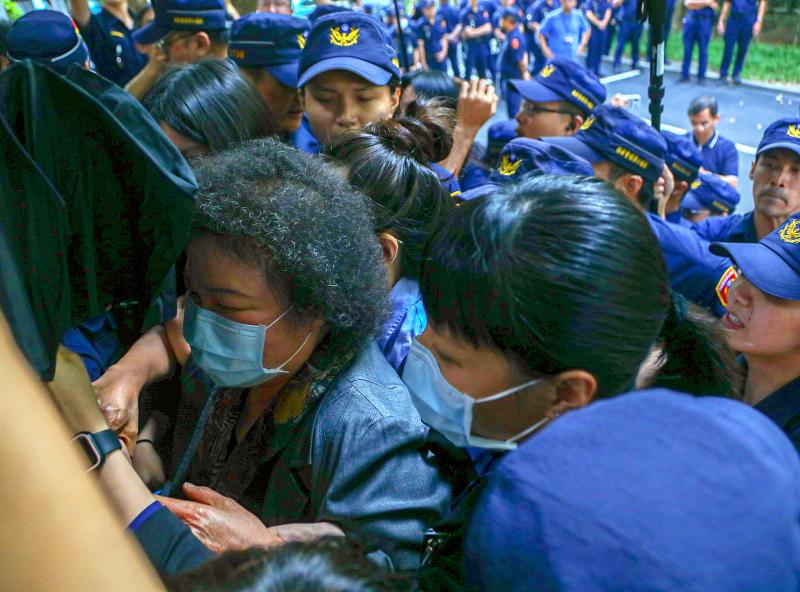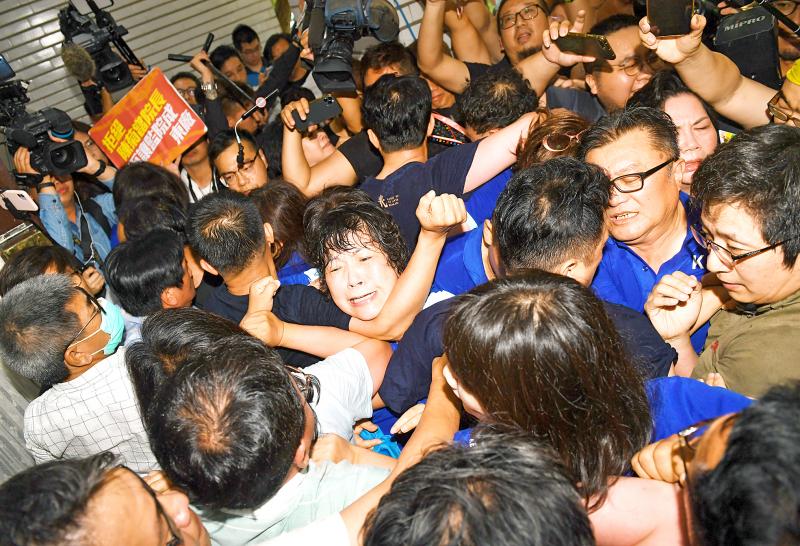Chinese Nationalist Party (KMT) Legislator Sandy Yeh (葉毓蘭) yesterday proposed amendments to the Legislators’ Conduct Act (立法委員行為法) to limit the power of police to constrain the personal freedom of lawmakers when in session at the Legislative Yuan.
The proposal comes after physical altercations involving KMT lawmakers who tried to block the nomination process of Control Yuan members in July.
KMT leaders had accused Legislative Speaker You Si-kun (游錫堃) of the Democratic Progressive Party of authorizing excessive police force to protect then-Control Yuan presidential nominee Chen Chu (陳菊), saying that involving the police had led to obstructions of their personal freedom and legislative duties.

Photo: CNA
Yeh proposed the amendments to outline strict rules on the use of police force inside the parliament.
“When police officers limit legislators’ movements and personal freedom, disrupting their legislative duties within the parliamentary grounds, severe punishment must be imposed, with sentences being 50 percent higher than usual. This proposed draft will be submitted next Tuesday,” Yeh said.
Prior to 1991, police had been deployed inside the Legislative Yuan six times, but they had no legal authorization, Yeh said, adding that police had not been deployed for the past 20 years, until July 14 this year.

Photo: CNA
“While legislators were to conduct a review of Control Yuan nominees, legislative top officials called for a large police force to enter the parliament and protect Chen Chu,” she said. “The police action undermined the Legislative Yuan’s independence, setting a deplorable precedent in violating the constitutional framework.”
“In France, Germany, Japan, the UK, the US and other democratic countries, they adhere to the constitutional codes and parliamentary rules,” she added.
Referring to Article 3 of the Organic Act of the Legislative Yuan (立法院組織法), which stipulates that the legislative speaker must maintain order and conduct legislative proceedings on the basis of fairness and objectivity, Yeh said that there are no provisions granting the speaker the right to deploy the police.
The authority to deploy the police should be limited to maintaining order and removing obstacles to legislative proceedings, she said, adding that “the rules must guarantee the independence and self-governance of the Legislative Yuan.”
“When obstructions to the proceedings occur, legislators across party lines must try to solve the problem within one day, conforming to the self-governance principle of the Legislative Yuan,” Yeh said.
Other than the Sixth Special Police Corps and one security police squadron at the Legislative Yuan, other police units should be in general prohibited from entering the parliament grounds, Yeh added.

The manufacture of the remaining 28 M1A2T Abrams tanks Taiwan purchased from the US has recently been completed, and they are expected to be delivered within the next one to two months, a source said yesterday. The Ministry of National Defense is arranging cargo ships to transport the tanks to Taiwan as soon as possible, said the source, who is familiar with the matter. The estimated arrival time ranges from late this month to early next month, the source said. The 28 Abrams tanks make up the third and final batch of a total of 108 tanks, valued at about NT$40.5 billion

A group from the Taiwanese Designers in Australia association yesterday represented Taiwan at the Midsumma Pride March in Melbourne. The march, held in the St. Kilda suburb, is the city’s largest LGBTQIA+ parade and the flagship event of the annual Midsumma Festival. It attracted more than 45,000 spectators who supported the 400 groups and 10,000 marchers that participated this year, the association said. Taiwanese Designers said they organized a team to march for Taiwan this year, joining politicians, government agencies, professionals and community organizations in showing support for LGBTQIA+ people and diverse communities. As the first country in Asia to legalize same-sex

MOTIVES QUESTIONED The PLA considers Xi’s policies toward Taiwan to be driven by personal considerations rather than military assessment, the Epoch Times reports Chinese President Xi Jinping’s (習近平) latest purge of the Chinese People’s Liberation Army (PLA) leadership might have been prompted by the military’s opposition to plans of invading Taiwan, the Epoch Times said. The Chinese military opposes waging war against Taiwan by a large consensus, putting it at odds with Xi’s vision, the Falun Gong-affiliated daily said in a report on Thursday, citing anonymous sources with insight into the PLA’s inner workings. The opposition is not the opinion of a few generals, but a widely shared view among the PLA cadre, the Epoch Times cited them as saying. “Chinese forces know full well that

Travel agencies in Taiwan are working to secure alternative flights for travelers bound for New Zealand for the Lunar New Year holiday, as Air New Zealand workers are set to strike next week. The airline said that it has confirmed that the planned industrial action by its international wide-body cabin crew would go ahead on Thursday and Friday next week. While the Auckland-based carrier pledged to take reasonable measures to mitigate the impact of the workers’ strike, an Air New Zealand flight arriving at Taipei from Auckland on Thursday and another flight departing from Taipei for Auckland on Saturday would have to